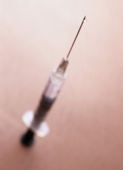- Could Artificial Sweeteners Be Aging the Brain Faster?
- Techniques for Soothing Your Nervous System
- Does the Water in Your House Smell Funny? Here’s Why
- Can a Daily Dose of Apple Cider Vinegar Actually Aid Weight Loss?
- 6 Health Beverages That Can Actually Spike Your Blood Sugar
- Treatment Options for Social Anxiety Disorder
- Understanding the Connection Between Anxiety and Depression
- How Daily Prunes Can Influence Cholesterol and Inflammation
- When to Take B12 for Better Absorption and Energy
- Epsom Salts: Health Benefits and Uses
Malaria Vaccine Shows Promise in Shielding African Children


According to the World Health Organization, about 584,000 people, mostly in Africa, die from mosquito-borne malaria each year.
Most of those victims are children, but the success of a new malaria vaccine in late-stage trials could offer real hope against the disease, experts say.
There is currently no vaccine for malaria, and the new vaccine, called RTS,S/AS01, was developed for use in sub-Saharan Africa, where malaria kills about 1,300 children every day.
The phase 3 trial of the vaccine included more than 15,400 newborns (ages 6 to 12 weeks at first vaccination) and children (5 to 17 months at first vaccination) at 11 sites in seven sub-Saharan African countries.
A team led by Brian Greenwood, of the London School of Hygiene and Tropical Medicine, reported that the vaccine protected the children more than the newborns, but protection weakened over time in both groups. The shot offered children 46 percent protection against malaria, compared to 27 percent protection for the newborns, the investigators found.
However, a booster dose improved protection and lowered the number of cases of malaria deemed to be “severe” by about a third in both newborns and children, according to the study published April 23 in The Lancet.
“Despite the falling efficacy over time, there is still a clear benefit from RTS,S/AS01,” Greenwood, a professor of clinical tropical medicine at the school, said in a journal news release.
“An average 1,363 cases of clinical malaria were prevented over four years of follow-up for every 1,000 children vaccinated, and 1,774 cases in those who also received a booster shot,” Greenwood said. “Over three years of follow-up, an average 558 cases were averted for every 1,000 infants vaccinated, and 983 cases in those also given a booster dose.”
Side effects such as convulsions, though rare, occurred more frequently in children given the new vaccine than in those who did not receive it, the researchers said.
However, “given that there were an estimated 198 million malaria cases in 2013, this level of efficacy potentially translates into millions of cases of malaria in children being prevented,” Greenwood explained in the news release.
More information
The U.S. National Institute of Allergy and Infectious Diseases has more about malaria.
Source: HealthDay
Copyright © 2026 HealthDay. All rights reserved.










